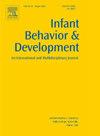经验很重要:照顾者与晚出生的自闭症幼儿的互动
IF 1.9
3区 心理学
Q3 PSYCHOLOGY, DEVELOPMENTAL
引用次数: 0
摘要
照顾者与儿童的互动对于支持有自闭症迹象的幼儿早期社会交流至关重要。这项研究调查了以前养育自闭症儿童的经历是否会影响照顾者与弟弟妹妹的互动。在自由游戏互动中,对照顾者的发展适当性和策略质量进行了评级,如:照顾者对幼儿二元社会参与(例如,参与/调节和使用环境策略),模仿和建模(例如,轮流)和游戏支持(例如,根据幼儿的水平调节游戏)的支持。此外,我们编码了照顾者对幼儿的非语言和语言交流的反应。具体来说,我们探讨了照顾者策略的使用和对幼儿沟通的反应是否在已经有较大自闭症儿童的照顾者和没有自闭症儿童的照顾者之间存在差异。参与者是115名有自闭症特征的照顾者和学步者(M年龄= 20个月),按照兄弟姐妹的身份分组:年长的自闭症兄弟姐妹(EL-Sibs, n = 23),非自闭症兄弟姐妹(l - sibs, n = 34),或者是长子(FB, n = 58)。二元logistic回归检验了策略使用和反应性,控制了幼儿年龄、发育水平、幼儿ADOS得分和家庭年收入。兄弟姐妹地位显著地预测了游戏相关策略,而不是二元社会参与或模仿/建模策略。照顾者的反应性与兄弟姐妹状况无关;然而,儿童年龄、发育水平和较高的家庭收入与较高的质量反应有关。研究结果表明,之前与自闭症相关的养育经历可能会积极地影响对后来出生的兄弟姐妹的某些照顾行为,特别是在以游戏为基础的互动中。本文章由计算机程序翻译,如有差异,请以英文原文为准。
Experience matters: Caregiver interactions with later-born toddlers with autism
Caregiver-child interactions are critical for supporting early social communication in toddlers showing signs of autism. This study examined whether prior experience parenting an autistic toddler influences how caregivers interact with younger siblings. During a free play interaction, caregivers were rated on the developmental appropriateness and quality of strategies such as: caregiver support for toddler’s dyadic social engagement (e.g., engagement/regulation and use of environmental strategies), imitation and modeling (e.g., turn-taking), and play support (e.g., modulating play to toddler’s level). Additionally, we coded caregiver responsiveness to the toddler’s nonverbal and verbal communication. Specifically, we explored whether caregiver strategy use and responsiveness to toddler communication differed between caregivers who already had an older child with autism and those who did not. Participants were 115 caregiver-toddler dyads (M age = 20 months) showing features of autism, grouped by sibling status: older autistic sibling (EL-Sibs, n = 23), a non-autistic sibling (LL-Sibs, n = 34), or were first-borns (FB, n = 58). Binary logistic regressions examined strategy use and responsiveness, controlling for toddler age, developmental level, toddler ADOS scores, and family annual household income. Sibling status significantly predicted play-related strategies but not dyadic social engagement or imitation/modeling strategies. Caregiver responsiveness was not associated with sibling status; however, child age, developmental level, and higher family income were associated with higher quality responsiveness. Findings suggest that prior autism-related parenting experience may positively shape certain caregiving behaviors with later-born siblings, specifically within play-based interactions.
求助全文
通过发布文献求助,成功后即可免费获取论文全文。
去求助
来源期刊

Infant Behavior & Development
PSYCHOLOGY, DEVELOPMENTAL-
CiteScore
4.10
自引率
4.80%
发文量
94
期刊介绍:
Infant Behavior & Development publishes empirical (fundamental and clinical), theoretical, methodological and review papers. Brief reports dealing with behavioral development during infancy (up to 3 years) will also be considered. Papers of an inter- and multidisciplinary nature, for example neuroscience, non-linear dynamics and modelling approaches, are particularly encouraged. Areas covered by the journal include cognitive development, emotional development, perception, perception-action coupling, motor development and socialisation.
 求助内容:
求助内容: 应助结果提醒方式:
应助结果提醒方式:


